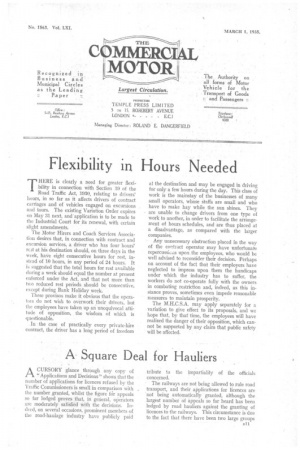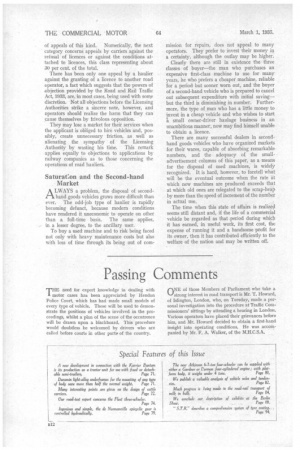A Square Deal for Hauliers
Page 25

Page 26

If you've noticed an error in this article please click here to report it so we can fix it.
ACURSORY glance through any copy of " Applications and Decisions" shows that the number of applications for licences refused by the Traffic Commissioners is small in Comparison with the number ,granted, whilst the figure fcir appeals so far lodged .proves that, in general, *tutors are moderately satisfied with the decisions. Indeed, on several occasions, prominent members of the road-haulage industry have publicly paid tribute to the impartiality of the officials concerned.
• The railways are not being allowed to rule road transport, and their applications for licences are not being automatically granted, although the largest number of appeals so far heard has been lodged by road hauliers against the granting of licences to the railways. This circumstance is due to the fact that there have been two large groups of appeals of this kind. Numerically, the next category concerns appeals by carriers against the refusal of licences or against the conditions attached to licences, this class representing about 30 per cent, of the total.
There has been only one appeal by a haulier against the granting of a licence to another road operator, a fact which suggests that the powers of objection provided by the Road and Rail Traffic Act, 1933, are, in most cases, being used with some discretion. Not all objections before the Licensing Authorities strike a sincere note, however, and operators should realize the harm that they can cause themselves by frivolous opposition.
They may lose a market for their services when the applicant is obliged to hire vehicles and, possibly, create unnecessary friction, as well as alienating the sympathy of the Licensing Authority by wasting his time. This remark applies equally to objections to applications by railway companies as to those concerning the operations of road hauliers.
SaturatIon and the Second-hand Market
ALWAYS a problem, the disposal of secondhand goods vehicles grows more difficult than ever. The odd-job type of haulier is rapidly becoming defunct, because modern conditions have rendered it uneconomic to operate on other than a full-time basis. The same applies, in a lesser degree, to the ancillary user.
To buy a used machine and to risk being faced not only with heavy maintenance costs but also with loss of time through its being out of corn mission for repairs, does not appeal to many operators. They prefer to invest their money in a certainty, although the outlay may be higher.
Clearly there are still in existence the three classes of buyer—the man who purchases an expensive first-class machine to use for many years, he who prefers a cheaper machine, reliable for a period but sooner worn out, and the buyer of a second-hand vehicle who is prepared to cancel out subsequent expenditure with initial saving— but the third is diminishing in number. Furthermore, the type of man who has a little money to invest in a cheap vehicle and who wishes to start a small owner-driver haulage business in an unambitious manner, now may find himself unable to obtain a licence.
There are many successful dealers in secondhand goods vehicles who have organized markets for their wares, capable of absorbing remarkable numbers, and the adequacy of the smalladvertisement columns of this paper, as a means for the disposal of used machines, is widely recognized. It is hard, however, to foretell what will be the eventual outcome when the rate al which new machines are produced exceeds that at which old ones are relegated to the scrap-heap by more than the speed of increment of the number in actual use.
The time when this state of affairs is realized seems still distant and, if the life of a commercial vehicle be regarded as that .period during which it has earned, in useful work, its first cost, the expense of running it and a handsome profit for its owner, then it has contributed efficiently to the welfare of the nation and may be written off.




























































































